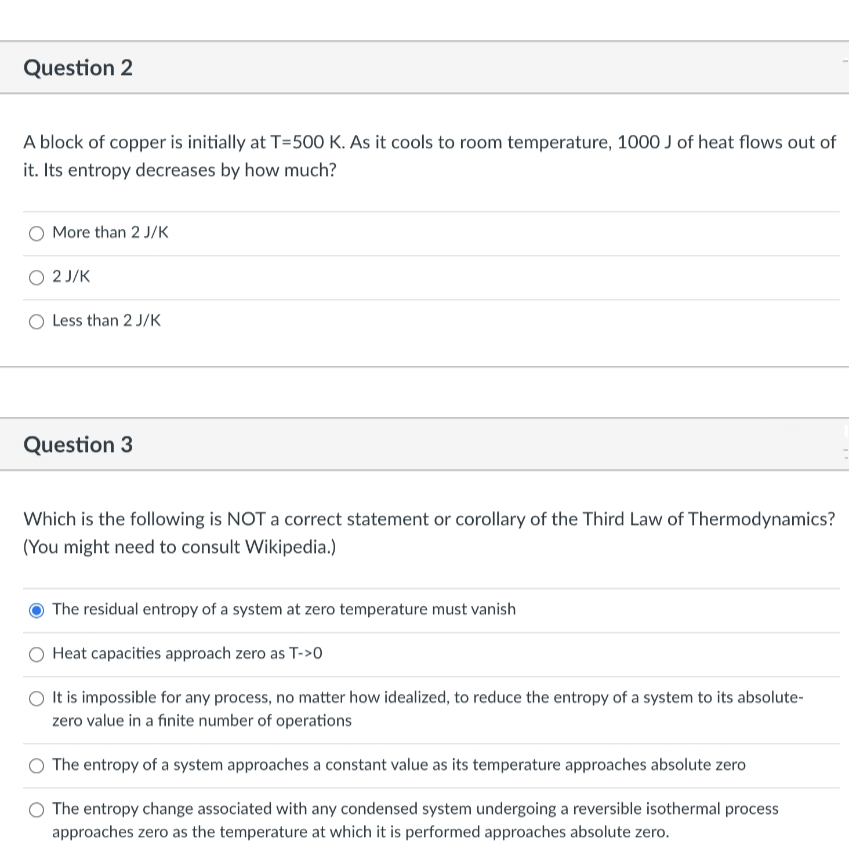A block of copper is initially at T=500 K. As it cools to room temperature, 1000 J of heat flows out of it. Its entropy decreases by how much? More than 2 J/K 2 J/K O Less than 2 J/K
A block of copper is initially at T=500 K. As it cools to room temperature, 1000 J of heat flows out of it. Its entropy decreases by how much? More than 2 J/K 2 J/K O Less than 2 J/K
Chemistry: Principles and Practice
3rd Edition
ISBN:9780534420123
Author:Daniel L. Reger, Scott R. Goode, David W. Ball, Edward Mercer
Publisher:Daniel L. Reger, Scott R. Goode, David W. Ball, Edward Mercer
Chapter17: Chemcial Thermodynamics
Section: Chapter Questions
Problem 17.78QE
Related questions
Question

Transcribed Image Text:Question 2
A block of copper is initially at T=500 K. As it cools to room temperature, 1000 J of heat flows out of
it. Its entropy decreases by how much?
More than 2 J/K
O 2 J/K
O Less than 2 J/K
Question 3
Which is the following is NOT a correct statement or corollary of the Third Law of Thermodynamics?
(You might need to consult Wikipedia.)
The residual entropy of a system at zero temperature must vanish
O Heat capacities approach zero as T->0
It is impossible for any process, no matter how idealized, to reduce the entropy of a system to its absolute-
zero value in a finite number of operations
The entropy of a system approaches a constant value as its temperature approaches absolute zero
The entropy change associated with any condensed system undergoing a reversible isothermal process
approaches zero as the temperature at which it is performed approaches absolute zero.
Expert Solution
This question has been solved!
Explore an expertly crafted, step-by-step solution for a thorough understanding of key concepts.
This is a popular solution!
Trending now
This is a popular solution!
Step by step
Solved in 2 steps with 2 images

Knowledge Booster
Learn more about
Need a deep-dive on the concept behind this application? Look no further. Learn more about this topic, chemistry and related others by exploring similar questions and additional content below.Recommended textbooks for you

Chemistry: Principles and Practice
Chemistry
ISBN:
9780534420123
Author:
Daniel L. Reger, Scott R. Goode, David W. Ball, Edward Mercer
Publisher:
Cengage Learning


Chemistry: An Atoms First Approach
Chemistry
ISBN:
9781305079243
Author:
Steven S. Zumdahl, Susan A. Zumdahl
Publisher:
Cengage Learning

Chemistry: Principles and Practice
Chemistry
ISBN:
9780534420123
Author:
Daniel L. Reger, Scott R. Goode, David W. Ball, Edward Mercer
Publisher:
Cengage Learning


Chemistry: An Atoms First Approach
Chemistry
ISBN:
9781305079243
Author:
Steven S. Zumdahl, Susan A. Zumdahl
Publisher:
Cengage Learning

Chemistry
Chemistry
ISBN:
9781305957404
Author:
Steven S. Zumdahl, Susan A. Zumdahl, Donald J. DeCoste
Publisher:
Cengage Learning

Chemistry & Chemical Reactivity
Chemistry
ISBN:
9781133949640
Author:
John C. Kotz, Paul M. Treichel, John Townsend, David Treichel
Publisher:
Cengage Learning

Physical Chemistry
Chemistry
ISBN:
9781133958437
Author:
Ball, David W. (david Warren), BAER, Tomas
Publisher:
Wadsworth Cengage Learning,